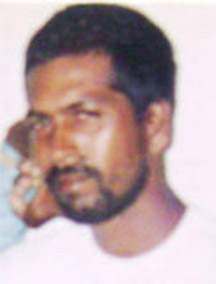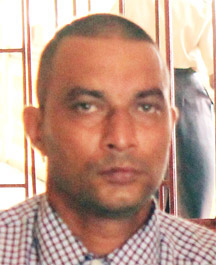-further deductions to be made for time served
Finding the 70-year sentence imposed against murder convict Lloyd Rampersaud, as being unduly “severe”, the Guyana Court of Appeal yesterday reduced it to 30 years, ordering that further deductions be made for time served.
Following his conviction and sentence back in March of 2013 for the 2009 murder of Munilall Mangru, Rampersaud appealed, arguing among other things, that the sentence was harsh, while advancing that trial judge Navindra Singh failed to direct the jury on how to deal with a number of “discrepancies” presented in the evidence.
Defence attorney George Thomas had questioned the basis of the conviction, while noting that the dead man’s sister had testified to seeing him alive and well on February 22nd, 2009, though the state contended that the man had met his demise the day before.

Counsel had opined that in light of the woman’s testimony, it raised the question/possibility as to whether Munilall may have met his end at the hands of someone else, especially since the pathologist had said that given the injuries inflicted on the deceased, he would have lived no more than four minutes after.
Acknowledging there to be a difference of accounts on this evidence, the appellate court said that while the trial judge did give directions to the jury on how it needed to treat with this discrepancy, he could have extended guidance a bit further, but the court did not say how.
At the appeal hearing, Chancellor Yonette Cummings-Edwards had questioned whether the jury was just left to “roam,” or whether it was taken as having sufficient common sense in dealing with such a glaring discrepancy.
In response, state counsel Teshana Lake had pointed to the latter.
Lake had said that notwithstanding the arguments proffered by the defence, the indictment itself was not specific to a particular date, but rather a period which included between February 21st and 24th of 2009.
Against this background she advanced, too, that one of the elements which the state has to prove in establishing liability for capital offences, is that the death of the deceased must occur within a year and a day of the injuries inflicted.
Clearly, she said, Munilall had succumbed well within that time frame.
The prosecutor had also asked the court to consider the fact that Rampersaud, (the appellant) had revealed in a caution statement to police, which was admitted in evidence, that he had killed Munilall.
In the unanimous decision handed down by the Chancellor and Justices of Appeal Rishi Persaud and Dawn Gregory, the court found that statement to have been properly tendered and admitted, following a voir dire which Justice Singh had conducted to determine its admissibility.
Rampersaud had told police that he and his friend, Shaeed Baksh, called ‘Towley,’ were carrying out a robbery on Mangru when they killed him.
According to the statement, Rampersaud said, “Towley vice he and me lash he with a piece of wood on he face and me see he tongue come out. Towley then cuff he up pon he face and me then tek out all he money from he crotch.”
Prosecutor Lake had said that the pathologist’s findings after examining the body, were consistent with the account provided by the convict, regarding the injuries and where they had been inflicted.
Severe
Addressing the sentence imposed which the appellate judges all found to be severe, Justice Cummings-Edwards who read the court’s ruling, said there seemed to have been no consideration by the trial judge, of possible factors which could have mitigated the sentence.
Pointing out that Rampersaud would have been charged before amendments to the Criminal Law Offences Act—when judges did not have discretion of imposing a term of years, the Chancellor said that while Justice Singh did impose years, it was too severe.
Against this background, she said that Rampersaud’s sentence would be reduced to 30 years and that further deductions are to be made for the time he would have so far spent in prison.
Rampersaud had been jointly charged with the capital offence along with his brother Roy Rampersaud. At the conclusion of their trial on March 8th, 2013, however, the jury found only Lloyd guilty, while unanimously acquitting his brother.
Lloyd had admitted to the police in his caution statement that he, Baksh, and Mangru went to buy $20,000 in cocaine from someone in his street.
He said that after they bought the cocaine, the three of them went under a bridge at Triumph public road and smoked it. He said, “Towley then bling me and tell me dat Boy get nuff money and we plan to rob he. Towley vice he and me lash he with a piece of wood on he face and me see he tongue come out. Towley then cuff he up pon he face and me then tek out all he money from he crotch.”
Baksh was one of the men charged with the murder but the charge against him was dropped by the Director of Public Prosecutions.
Lloyd also said the total amount of money Mangru had on him was $40,000 and it was divided between him and Baksh and he added that afterward he went home and he told his brother Roy what happened. He said that he also went to drink high wine and smoked out the money he stole from Mangru.
Baksh’s deposition, which was admitted as evidence in the trial, had implicated the Rampersauds in the crime.
Mangru’s body was found under a bridge linking Mon Repos and Triumph, on the East Coast of Demerara.






